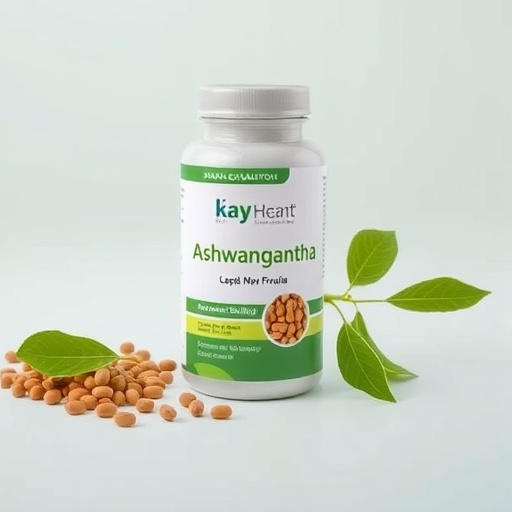In a groundbreaking study that has captured the attention of health enthusiasts and researchers alike, a novel formulation of Ashwagandha, branded as Zenroot™, has shown remarkable improvements in bioavailability. Conducted by a team led by Ramapalaniappan, Loganathan, and Morde, this research emphasizes the importance of bioavailability for herbal supplements and their effectiveness in promoting overall wellness. The study, published in Advanced Therapeutics, presents evidence of enhanced absorption compared to traditional Ashwagandha supplements.
Ashwagandha, known scientifically as Withania somnifera, has a long history in Ayurvedic medicine, where it is revered for its adaptogenic properties, helping the body manage stress and promoting cognitive functions. Despite its popularity, the effectiveness of Ashwagandha largely depends on its ability to be absorbed by the human body. Prior formulations often faced challenges regarding bioavailability, limiting their therapeutic potential. The recent trials with Zenroot™ seek to address these limitations.
The core of the research involved a randomized, double-blind, single-dose study, which is considered the gold standard in clinical trials for ensuring objectivity and reliability. Conducted on a cohort of healthy adults, this approach eliminated biases and provided robust data regarding the performance of Zenroot™. Participants were monitored closely, with blood and urine samples taken at various intervals to assess the absorption rates of the active compounds found in Ashwagandha.
The findings from this study reveal that Zenroot™ demonstrated superior bioavailability, significantly greater than conventional forms of Ashwagandha available in the market. Specifically, the bioactive compounds, including withanolides, were absorbed more effectively, leading to enhanced physiological responses. The key to this success lies in the innovative formulation of Zenroot™, which integrates advanced molecular techniques to enhance the solubility and stability of these compounds in digestive fluids.
The implications of these findings are substantial, particularly for individuals seeking natural alternatives to manage stress, improve energy levels, and enhance cognitive capabilities. With an increasing trend towards natural wellness products, such evidence underscores the importance of focusing on both quality and bioavailability in herbal formulations. The study sets a new benchmark for further research and development in the field of herbal medicine.
Moreover, the researchers highlighted that the results of this study open doors to further investigations into dose optimization and long-term safety profiles of the Zenroot™ formulation. Future studies could potentially explore how this improved bioavailability translates into clinical benefits over extended periods, guiding healthcare professionals in their recommendations for herbal supplements.
This advancement may not only change how Ashwagandha is perceived but could also revolutionize the market with more effective formulations becoming available. As demand for natural health products continues to rise, consumers are becoming increasingly educated and discerning regarding their choices. This study arrives at an opportune moment in this evolving landscape, stressing the need for scientific validation of health claims associated with herbal products.
Furthermore, the significance of this research extends beyond Ashwagandha. It underscores a broader trend in herbal medicine that prioritizes scientific rigor and evidence-based practices. The successful demonstration of Zenroot™’s superior bioavailability could inspire similar innovations in other herbal supplements, resulting in a more potent and effective wellness ecosystem.
As scholars analyze the findings of this research, the potential integration of Zenroot™ into broader health frameworks remains a hot topic. If further studies confirm the improvements in health outcomes associated with its use, it may become a cornerstone in dietary recommendations for managing stress and enhancing mental clarity.
Critically, this study also raises pertinent questions regarding regulatory standards for herbal supplements. As manufacturers rush to capitalize on the findings of such studies, there will be a growing need for oversight to ensure that consumers receive products that are safe, effective, and deliver on their promises. The health supplement industry is notorious for variability in product quality, and rigorous research such as this plays a vital role in establishing consumer trust.
In conclusion, the research team’s dedication to understanding and enhancing the bioavailability of Ashwagandha through the Zenroot™ formulation marks a pivotal moment in herbal medicine. With promising results now in hand, the stage is set for future exploration into the vast potential of herbal supplements, where rigorous scientific investigation and traditional knowledge intersect, ultimately benefiting consumers seeking natural health solutions.
The journey isn’t over yet; as the scientific community digests these findings, potential future applications and developments are exciting to consider. Individuals invested in their wellness should remain informed as more insights into Zenroot™ and similar innovations emerge, ensuring they can make educated choices regarding their health.
As this area of research evolves, the focus will likely shift to understanding consumer experiences and the practicalities of integrating such formulations into daily health routines. With more studies on the horizon, the anticipation builds around the next significant breakthroughs in the realm of herbal medicine and bioavailability.
Ultimately, the endeavor to enhance bioavailability in herbal supplements like Ashwagandha represents a synthesis of the ancient wisdom of Ayurvedic practices and the cutting-edge capability of modern science, laying the groundwork for future efforts aimed at enriching lives through holistic health solutions.
Subject of Research: Bioavailability of Ashwagandha in the formulation Zenroot™
Article Title: Superior Bioavailability of a Novel 1.5% Ashwagandha Formulation (Zenroot™): A Randomized, Double-Blind, Single-Dose, Comparative, Oral Bioavailability Study in Healthy Adults.
Article References:
Ramapalaniappan, A., Loganathan, V., Morde, A. et al. Superior Bioavailability of a Novel 1.5% Ashwagandha Formulation (Zenroot™): A Randomized, Double-Blind, Single-Dose, Comparative, Oral Bioavailability Study in Healthy Adults.
Adv Ther (2025). https://doi.org/10.1007/s12325-025-03292-7
Image Credits: AI Generated
DOI: 10.1007/s12325-025-03292-7
Keywords: Ashwagandha, Zenroot™, Bioavailability, Herbal Supplements, Advanced Therapeutics.




